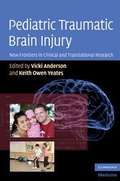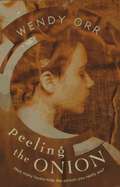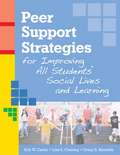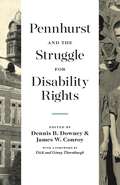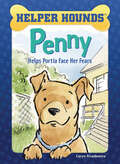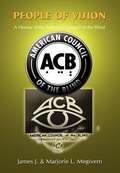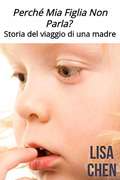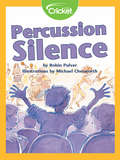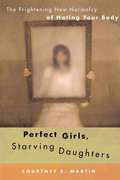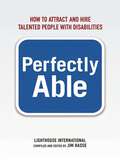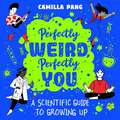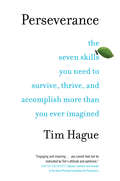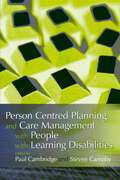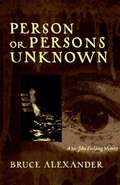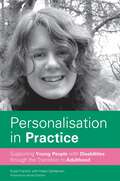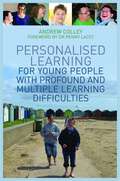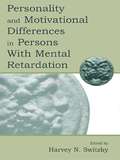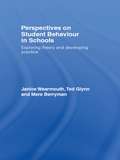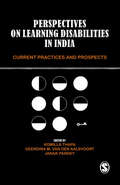- Table View
- List View
Pediatric Traumatic Brain Injury
by Vicki Anderson Keith Owen YeatesTraumatic brain injury (TBI) is a leading cause of death and disability in children and adolescents Worldwide and represents a largely "silent" public health epidemic. Advances in acute medical care have resulted in better survival rates, but long-term quality of life remains of ongoing concern. The cognitive, emotional and behavioral consequences of TBI frequently pose life long problems for these children and their families leading to substantial economic and societal costs.
Peeling the Onion
by Wendy OrrTold in the first person, this is a detailed story of the physical and emotional difficulties 17-year-old Anna must struggle with as she recovers from a devastating automobile accident that, although she is alive and not paralyzed, destroys her dreams and her plans for her life
Peer Support Strategies For Improving All Students' Social Lives And Learning
by Erik W. Carter Craig H. Kennedy Lisa S. CushingPeer supports really work: they're a great, efficient way to help all students learn, make the most of teacher/ paraprofessional time, and increase the achievement level of challenging students. This is the concise, practical guide every middle and high school needs to implement peer support strategies--including cooperative learning and peer tutoring--to benefit students with moderate to severe disabilities and their peers. With this reader-friendly, step-by-step planning guide from the foremost authorities on peer supports, educators, paraprofessionals, and other school staff will discover how peer supports are a "two-way street," boosting the academic outcomes, social skills, and self-esteem of students with disabilities and the peers who support them determine which students might benefit most from peer supports recruit and match the students most likely to form mutually beneficial relationships develop effective support plans that promote access to the general curriculum work peer supports into IEP goals to meet state and national academic standards give students the training and guidance they need to approach their support roles with confidence and enthusiasm clarify the responsibilities of everyone involved in a peer support system: students, general and special educators, paraprofessionals and other school staff provide peers with constructive ongoing feedback extend peer supports to school activities and extracurricular events evaluate the social and academic impact of peer support arrangements A complete, start-to-finish guide to peer supports, this book is packed with photocopiable planning, implementation, and evaluation tools; evidence-based strategies; and vignettes that illustrate successful peer supports. With this must-have book on one of the hottest topics in inclusive education, educators and paraprofessionals will create schools where all students--with and without disabilities--help each other reach their academic goals, make new friends, and live full and meaningful lives.
Pennhurst and the Struggle for Disability Rights (Keystone Books)
by Dennis B. Downey James W. ConroyConceived in the era of eugenics as a solution to what was termed the "problem of the feeble-minded," state-operated institutions subjected people with intellectual and developmental disabilities to a life of compulsory incarceration. One of nearly 300 such facilities in the United States, Pennhurst State School and Hospital was initially hailed as a "model institution" but was later revealed to be a nightmare, where medical experimentation and physical and psychological abuse were rampant. At its peak, more than 3,500 residents were confined at Pennhurst, supervised by a staff of fewer than 600.Using a blended narrative of essays and first-person accounts, this history of Pennhurst examines the institution from its founding during an age of Progressive reform to its present-day exploitation as a controversial Halloween attraction. In doing so, it traces a decades-long battle to reform the abhorrent school and hospital and reveals its role as a catalyst for the disability rights movement. Beginning in the 1950s, parent-advocates, social workers, and attorneys joined forces to challenge the dehumanizing conditions at Pennhurst. Their groundbreaking advocacy, accelerated in 1968 by the explosive televised exposé Suffer the Little Children, laid the foundation for lawsuits that transformed American jurisprudence and ended mass institutionalization in the United States. As a result, Pennhurst became a symbolic force in the disability civil rights movement in America and around the world.Extensively researched and featuring the stories of survivors, parents, and advocates, this compelling history will appeal both to those with connections to Pennhurst and to anyone interested in the history of institutionalization and the disability rights movement.
Pennhurst and the Struggle for Disability Rights (Keystone Books)
by Dennis B. Downey James W. ConroyConceived in the era of eugenics as a solution to what was termed the “problem of the feeble-minded,” state-operated institutions subjected people with intellectual and developmental disabilities to a life of compulsory incarceration. One of nearly 300 such facilities in the United States, Pennhurst State School and Hospital was initially hailed as a “model institution” but was later revealed to be a nightmare, where medical experimentation and physical and psychological abuse were rampant. At its peak, more than 3,500 residents were confined at Pennhurst, supervised by a staff of fewer than 600.Using a blended narrative of essays and first-person accounts, this history of Pennhurst examines the institution from its founding during an age of Progressive reform to its present-day exploitation as a controversial Halloween attraction. In doing so, it traces a decades-long battle to reform the abhorrent school and hospital and reveals its role as a catalyst for the disability rights movement. Beginning in the 1950s, parent-advocates, social workers, and attorneys joined forces to challenge the dehumanizing conditions at Pennhurst. Their groundbreaking advocacy, accelerated in 1968 by the explosive televised exposé Suffer the Little Children, laid the foundation for lawsuits that transformed American jurisprudence and ended mass institutionalization in the United States. As a result, Pennhurst became a symbolic force in the disability civil rights movement in America and around the world.Extensively researched and featuring the stories of survivors, parents, and advocates, this compelling history will appeal both to those with connections to Pennhurst and to anyone interested in the history of institutionalization and the disability rights movement.
Penny Helps Portia Face Her Fears (Helper Hounds)
by Caryn RivadeneiraPortia has overcome a lot in life. Born with Down syndrome, Portia has been through many surgeries, lots of doctor's appointments, and strange looks from people who want to limit what she can do. Inside herself, Portia knows she can do anything—including getting over her fear of dogs. But when Penny shows up at Portia's house, she isn't so sure. After all, Penny is a pit bull—the scariest dogs of all, right? Good thing Penny has a few tricks of her own to win Portia's trust.
People of Vision: A History of the American Council of the Blind
by James J. Megivern Marjorie L. MegivernPeople of Vision: A History of the American Council of the Blind. The history of the treatment of individuals who are blind by other members of society is fraught with misconceptions, prejudices, myths, and stereotypes. <p><p> There are those who believe that blind people are OK as long as they stay "in their place," removed from society. Others feel that blind individuals are helpless and hopeless, deserving only of charity and pity. Still others have the notion that all blind people can be taught certain skills which make them unusually suited to a few specific jobs. The idea that people who are blind are first of all people, capable of and deserving the opportunity to be fully assimilated, fully participating members of society as equals has gained some recognition in certain parts of this country but still has a long way to go.
Perceptual Factors in Braille Word Recognition
by Carson Y. Nolan Cleves J. KederisThis monograph presents the findings of several years of study of the braille system as a communication process.
Perché Mia Figlia Non Parla? Storia del viaggio di una madre
by Lisa Chen Sabrina AntonioliQuesto libro è basato su una storia vera ed è un'opera di saggistica creativa. Gli eventi rappresentati sono reali ma in alcuni casi sono stati romanzati per una resa efficace, o minimizzati per proteggere le persone direttamente coinvolte. Inoltre, i nomi e le caratteristiche identificative sono stati modificati per proteggere la privacy delle persone. Sebbene l'autore e l'editore abbiano compiuto ogni sforzo per garantire che le informazioni contenute in questo libro fossero corrette al momento della stampa, l'autore e l'editore con la presente non si assumono, e con la presente declinano, ogni responsabilità nei confronti di terzi per eventuali perdite, danni o interruzioni causate da errori o omissioni, se tali errori o omissioni derivano da negligenza, incidente o altre cause. Le informazioni contenute all'interno di questo e-book hanno soltanto finalità informative generali. Questo libro non è da intendersi quale sostituto di consulenza medica da parte di medici, di esperti e di terapisti. Il lettore dovrebbe consultare regolarmente un medico per le questioni riguardanti il/la proprio/a figlio/a, con particolare attenzione a tutti i sintomi che potrebbero richiedere una diagnosi o un'assistenza medica. Nessuna parte di questo libro può essere riprodotta o trasmessa in alcuna forma, o con alcun mezzo, elettronico o meccanico, incluso fotocopie, registrazioni o sistemi di salvataggio e di recupero di informazioni, senza il permesso scritto dell'autore. Copyright © 2017 di Lisa Chen Tutti i diritti riservati.
Percussion Silence
by Robin PulverZack's brother has special needs and meets weekly with a music therapist. When the family attends a percussion concert, Zack is concerned that Danny will embarrass him in front of the entire audience.
Perfect Girls, Starving Daughters: The Frightening New Normalcy of Hating Your Body
by Courtney E. Martin"Why does every one of my friends have an eating disorder, or, at the very least, a screwed-up approach to food and fitness?" writes journalist Courtney E. Martin. The new world culture of eating disorders and food and body issues affects virtually all -- not just a rare few -- of today's young women. They are your sisters, friends, and colleagues -- a generation told that they could "be anything," who instead heard that they had to "be everything." Driven by a relentless quest for perfection, they are on the verge of a breakdown, exhausted from overexercising, binging, purging, and depriving themselves to attain an unhealthy ideal. An emerging new talent, Courtney E. Martin is the voice of a young generation so obsessed with being thin that their consciousness is always focused inward, to the detriment of their careers and relationships. Health and wellness, joy and love have come to seem ancillary compared to the desire for a perfect body. Even though eating disorders first became generally known about twenty-five years ago, they have burgeoned, worsened, become more difficult to treat and more fatal (50 percent of anorexics who do not respond to treatment die within ten years). Consider these statistics: Ten million Americans suffer from eating disorders. Seventy million people worldwide suffer from eating disorders. More than half of American women between the ages of eighteen and twenty-five would prefer to be run over by a truck or die young than be fat. More than two-thirds would rather be mean or stupid. Eating disorders have the highest mortality rate of any psychological disease. In Perfect Girls, Starving Daughters, Martin offers original research from the front lines of the eating disorders battlefield. Drawn from more than a hundred interviews with sufferers, psychologists, nutritionists, sociocultural experts, and others, her exposé reveals a new generation of "perfect girls" who are obsessive-compulsive, overachieving, and self-sacrificing in multiple -- and often dangerous -- new ways. Young women are "told over and over again," Martin notes, "that we can be anything. But in those affirmations, assurances, and assertions was a concealed pressure, an unintended message: You are special. You are worth something. But you need to be perfect to live up to that specialness." With its vivid and often heartbreaking personal stories, Perfect Girls, Starving Daughters has the power both to shock and to educate. It is a true call to action and cannot be missed.
Perfectly Able: How to Attract and Hire Talented People with Disabilities
by Jim HasseMore than 22 million of the almost 173 million working-age individuals in the United States have one or more disabilities. Perfectly Ableoffers practical guidance for companies large and small on how to hire and retain talented and motivated people from within this largely untapped pool of potential employees. Illustrated with enlightening personal stories, this one-of-a-kind book provides insight into what it's like to seek employment as an individual with a disability. Readers will discover how to: * Evaluate how suited their workplace environment is for disabled or different employees and what needs to be changed * Improve and sustain their workforce by hiring the best people, regardless of any disability or diversity issue * Effectively recruit, place, and develop individuals with disabilities who can contribute to their company's success * Embrace the differences among their workforce to add value to the organization
Perfectly Weird, Perfectly You: A Scientific Guide to Growing Up
by Camilla PangUSE SCIENCE AS YOUR GUIDEBOOK FOR GROWING UP PERFECTLY WEIRD, AND PERFECTLY YOU.Growing up, Dr Camilla Pang loved patterns and ordering things. She was obsessed with Disney, infatuated by Stephen Hawking and the language she only really understood was science. Diagnosed with autism age 8, Camilla felt like an outsider - and kids often like nothing better than to gang up on outsiders.This is the story of how Camilla used science as her sidekick for navigating the world- allowing her to translate ideas she could understand (like gravity and light waves) onto things she couldn't (like people, how long to smile for, and when someone needed a hug).Now she is sharing her scientific survival guide with you - so you can grow up with the courage to be yourself, no matter how different you feel or how hard you might find it to connect. Because the hard bit of growing up isn't other people - their opinions, their friendship groups, their popularity, their exam results. No, the hard bit is you: learning who you are as a person, having confidence in your own instincts, and understanding what actually makes you happy. And the really hard part is accepting that it's completely normal to be perfectly weird.(P) 2022 Hodder & Stoughton Limited
Perkins: The Cat Who Was More Than a Friend
by Linda YeatmanAlthough David is blind, he knows his beloved cat Perkins better than anyone else in the family; but when Perkins is accidentally exchanged for a similar cat, no one wants to believe David.
Perseverance: The Seven Skills You Need to Survive, Thrive, and Accomplish More Than You Ever Imagined
by Tim HagueAn inspiring story of beating the odds and learning to overcome--no matter what life hands you.After starting a family and flourishing in his career, Tim Hague was struck by misfortune. The irritating tremor in his foot turned out to be early onset Parkinson's disease. He was only 46 years old. But what seemed to be an end became a new beginning. Just three years later, Hague won the inaugural The Amazing Race Canada (with his son, Tim Jr., as his teammate). His remarkable life story shows that perseverance is not just a matter of willpower: it is a skill that can be learned and honed. And perseverance is the theme of his life. From the day he was born, Hague has gone from one struggle to another. Yet, remarkably, he doesn't have a trace of self-pity. In fact, he feels blessed. From his tough start in life as an unwanted mixed-race baby born in Texas in 1964, to his eventual move to the unforgiving climate of Winnipeg, Canada, to start a family under difficult circumstances, and his continuing battle with Parkinson's--Hague's life is a roadmap of perseverance. Parkinson's has forced him to retire early from the work he loves as a registered nurse. But as a healthcare professional, and now suffering from a challenging disease himself, Hague discusses living with Parkinson's like no one else could. He now works with charities to help promote Parkinson's awareness and his "Live Your Best" message. Drawing on his experience winning The Amazing Race, and referencing cutting-edge research and studies, Hague weaves a moving story of failure and success, outlining the elements of his philosophy that anyone can apply to their own lives, including: * The nature of luck: Luck comes to those who keep trying until the end--never stop until the race is over. * Find community: As a nurse, a husband and father, and a man living with Parkinson's, Hague knows better than most that we all need to ask for help sometimes, and that's a good thing. * Accept limits: By focusing on what we can do, we accomplish more than we ever thought possible. * Cease striving: We think of striving as a positive attribute, but all we end up doing is banging our heads against the wall. Have goals, but have fun. Do not create anxiety out of nothing and maintain perspective. * Live Your Best: No such thing as giving 110%--can only do your best. Inspirational and entertaining, Hague's message is both simple and profound: perseverance isn't just something a person has, or a trait we admire in others. Hague's book, like his life, is a guide to how we can all learn to persevere in the face of daily struggles--or even life-changing illness.
Person Centred Approaches When Supporting People with a Learning Disability
by Liz TillyThis book will support your learning about person centred approaches for the Common Induction Standards and the diploma units:
Person Centred Planning and Care Management with People with Learning Disabilities
by Jim Mansell Robina Shah Paul Cambridge Steven Carnaby'This excellent, informative and well presented, a book provides the reader with fourteen edited chapters covering an area of policy and practice that is quite specific but will inform anyone interested in the development of a service user participation ethos in adult social care. It is a book that is relevant to managers and practitioners, both as students and qualified professionals, as well as academics. Care management is now well established in the everyday practice of predominantly statutory organisations. This book revisits the principles of this method of assessing and planning the care needs of adult service users, and introduces Person Centred Planning (PCP) as a suitable method for ensuring that much of the empowerment rhetoric care management is actually realised.' - British Journal of Social Work 'Part of the attraction of this book is its strong practice component. This is applicable to the different professionals working with people with learning disabilities, in whatever their service configuration. For students, the book will also provide a good introduction to the impact of person centred planning and its connections to a long history of similar initiatives.' - Journal of Interprofessional Care 'This book is a stimulating and challenging read of those working in service development generally, as well as learning disability services. There is a potential broad care management readership that might also find this relevant and interesting.' - Journal of Interprofessional Care 'This is an important book. It brings together chapters by many of the foremost researchers and practitioners in person centred planning. The book contains many ideas for taking the PCP process to a higher level of sophistication to really underpin the future development of appropriate and effective services.' - Community Living 'This book will help social workers to reconnect with the core values of their profession and to challenge institutionalised policies and practices. It has proven to be a valuable teaching resource and whilst its focus is on people with learning disabilities, the principles of PCP that it raises are relevant to any service user group and social work arena. Highly recommended.' - Professional Social Work 'There are many important issues facing the care management system today in the light of person-centred planning and approaches, and you would be hard-pressed to find a better collection of insightful and radical thinkers in this area than those featured here. It asks hard questions, and challenges the professional to adopt more inclusive and accessible work practices. Wherever you work in the field of learning difficulties you should read this book carefully and aim to put "person-centeredness" at the core of your practice.' - Community Care 'You would be hard-pressed to find a better collection of insightful and radical thinkers in the area of care management. Wherever you work in the field of learning difficulties you should read this book carefully and seek to put "person centredness" at the core of your practice. The challenge for professionals, is making it a reality for individuals.' - Community Care This timely book provides a reflective analysis of person centred planning for people with learning disabilities, complementing policy initiatives that focus on individualised planning and service user involvement. Drawing on practical experience and research findings, the contributors explore policy and practice issues, including: * advocacy and empowerment * risk management and adult protection * inter-agency and inter-professional working * ethnicity and culture * de-institutionalisation. Vivid case studies illustrate best practice in person centred planning, and the authors offer a rich variety of ideas for increasing the participation, self-esteem and quality of life of people with learning disabilities. This practical and accessible text is an invaluable guide for policy makers, carers and social work managers, academics and students.
Person or Persons Unknown (Sir John Fielding Mystery #4)
by Bruce AlexanderLegendary nineteenth-century London judge Sir John Fielding returns in the fourth--and most thrilling--of Bruce Alexander's highly praised mysteries. From the first book, the mystery lovers verdict has been unanimous: the Fielding hooks are "enthralling" (The New York Times Book Review), "first-rate" (The Boston Globe), "wonderful, beautifully written and altogether fun: (The Washington Post). John Fielding was famous not only as cofounder of London's first police force, the Bow Street Runners, but also as a magistrate of keen intellect, fairness and uncommon detective ability. When a crime was committed, he often took it upon himself to solve it. What made this all the more remarkable was that he was blind. Now the blind magistrate and his young assistant and ward, Jeremy Proctor, face a series of crimes that hit shockingly close to home. Prostitutes are being murdered around Covent Garden, and there are troubling implications about the identity of the killer. Baffled and frustrated, Fielding devises a daring and desperate plan, but the consequences are unexpected and more terrible even than he could imagine. Filled with the authentic sights and sounds and atmosphere of the times, and with a supremely colorful and varied cast of characters, Person or Persons Unknown is in every way a worthy addition to a marvelous series. BRUCE ALEXANDER is the pseudonym for a well-known author of fiction and nonfiction. The previous books in the series are Blind Justice, Murder in Grub Street (named by The New York Times Book Review as one of the Notable Books of 1995 in crime fiction) and Watery Grave. Alexander is at work on the fifth Sir John Fielding novel.
Personal Power: The iOS Edition
by Michael FeirPersonal Power; The iOS Edition is a guide for blind people who either own or are interested in using iOS devices made by Apple. Namely, iPHONEs, iPAds and iPODs. No prior experience is presumed.
Personalisation in Practice: Supporting Young People with Disabilities through the Transition to Adulthood
by Helen Sanderson Nicola Gitsham Suzie FranklinThis book demonstrates very clearly how the personalisation of support and services works in practice. The authors describe how Jennie, a young person with autism and learning difficulties, was supported through the transition from school to living independently using simple, evidence-based person-centred planning tools. Jennie's story illustrates the importance of quality person-centred reviews, dispels the many myths surrounding Individual Service Funds and personal budgets and demonstrates how families, schools and other agencies can work collaboratively to help young people with disabilities move into adulthood with more choice and control over their lives, and with better life prospects. Practical pointers for readers to apply to their own circumstances are included, and the book contains helpful examples of the key person-centred thinking tools. Anyone involved in supporting children and young people with disabilities as they approach adulthood, including parents and carers, SENCOs, teachers, social workers and service providers, will find this to be essential reading. More generally, it will be an informative resource for those seeking a better understanding of how personalisation and person-centred planning work in practice.
Personalised Learning for Young People with Profound and Multiple Learning Difficulties
by Andrew ColleyChallenging the notion that young people with profound and multiple learning difficulties (PMLD) should be taught in a linear, target-driven way, this book presents an innovative model for creating learning opportunities to suit the needs and abilities of each individual student. Focusing on students with PMLD aged 14 and over, and addressing their unique needs as they progress towards adult life, the author explains how to create a truly personalised programme for each individual that recognises their right to autonomy whilst also acknowledging their learning difficulties. Practical strategies for dealing with common areas of difficulty such as communication and behaviour are included, and the book contains useful solutions to practical considerations such as timetabling, staffing, assessments and target-setting, and adapting the physical and sensory environment for students with PMLD. A final section looks at opportunities for students with PMLD post-secondary education. Realistic and accessible, this book is essential reading for teachers, teaching assistants and others involved in educating young people with PMLD.
Personality and Motivational Differences in Persons With Mental Retardation (The LEA Series on Special Education and Disability)
by Harvey N. SwitzkyThis book presents the most comprehensive review of research regarding personality and motivational differences in persons with mental retardation. From the personal commentary of Edward Zigler, H. Carl Haywood, and Harvey N. Switzky, the book summarizes the classical work of the Yale and Peabody-Vanderbilt School over the last 40 years. A sampling of new directions in research is provided, including work on self-determination theory and practice; decision making; direct and indirect effects of genetic mental retardation syndromes on personality; personality and psychopathology in genetic mental retardation syndromes; a new theory of information processing linking cognition, motivation, and performance; and a sensitivity theory of motivation. This definitive work presents older and evolving newer models and applications to the field in order to demonstrate the power of motivational variables in understanding the behavior of persons with mental retardation. The purpose is to enhance the quality of life in persons with mental retardation and other developmental disabilities.
Perspectives on Student Behaviour in Schools: Exploring Theory and Developing Practice
by Janice Wearmouth Mere Berryman Ted GlynnThe authors of this comprehensive text discuss the root causes of disruptive behaviour, tackle assessment issues and develop effective intervention strategies that will be of practical use to teachers and other educators. Whilst theorising behaviour management from a range of perspectives: psychodynamic, behavioural and socio-cultural, the authors remain firmly focused on practical issues of policy making, assessment and intervention, and address a wide range of related issues, such as: policy in relation to behaviour in schools at local authority, national and international level cultural concerns, race, gender, school discipline and exclusion medical perspectives of topical interest such as ADHD, autism and diet assessment at district, community, classroom and individual level, and how these underpin theory. This book will appeal to anyone for whom behaviour in schools is a key concern, such as student teachers, teacher educators, senior school managers and practising teachers undertaking further study in the field.
Perspectives on Learning Disabilities in India: Current Practices and Prospects
by Komilla Thapa Geerdina M. Van Der Aalsvoort Janak PandeyLearning disabilities (LDs) remain one of the least understood and most debated disabling conditions that affect children. Perspective on Learning Disabilities in India: Current Practices and Prospects showcases how researchers and practitioners in the country have evolved strategies to resolve the fundamental questions related to LDs, while focusing on marginalized and disadvantaged groups. It not only highlights the basic issues and controversies in this field but also presents innovative, theory-driven approaches to the assessment and remediation of LDs. It also emphasizes the role of teachers—a useful resource in the absence of trained professionals—in the identification of LDs in children. The book offers a rich overview of ways to proceed in case of LDs, thus making it a must-read for researchers, experts, and professionals associated with this field. The expert contributors to this volume provide heuristic insights that can facilitate the formulation of a research agenda and services for people with LDs in India, where research and practice in the field is still at a nascent stage.
Pete and Jem: A Grammar Tales Book to Support Grammar and Language Development in Children (Grammar Tales)
by Jessica HabibPete and Jem are having lots of fun playing in the snow until they run into each other and fall over. Targeting Subject-Verb sentences and present progressive verbs, this book provides repeated examples of early developing syntax and morphology which will engage and excite the reader while building pre-literacy skills and make learning fun, as well as exposing children to multiple models of the target grammar form. Perfect for a speech and language therapy session, this book is an ideal starting point for targeting client goals and can also be enjoyed at school or home to reinforce what has been taught in the therapy session.
